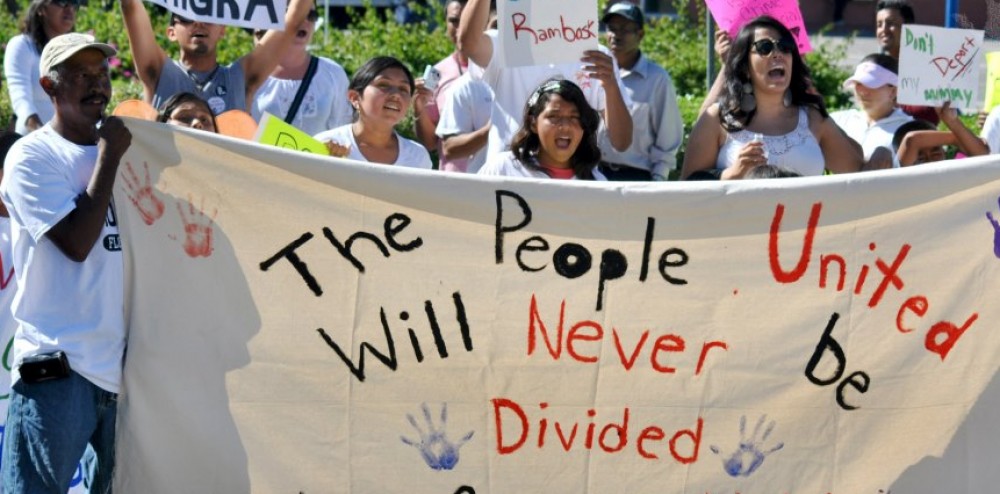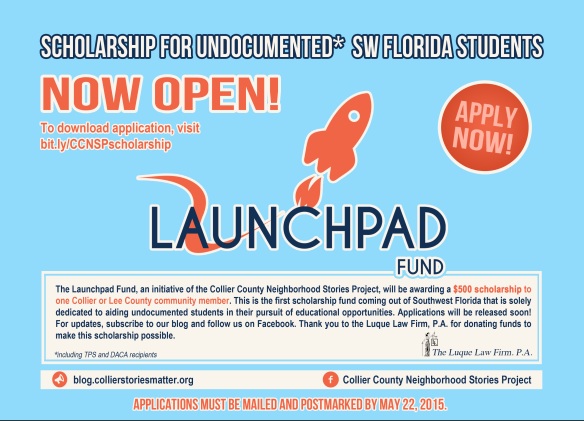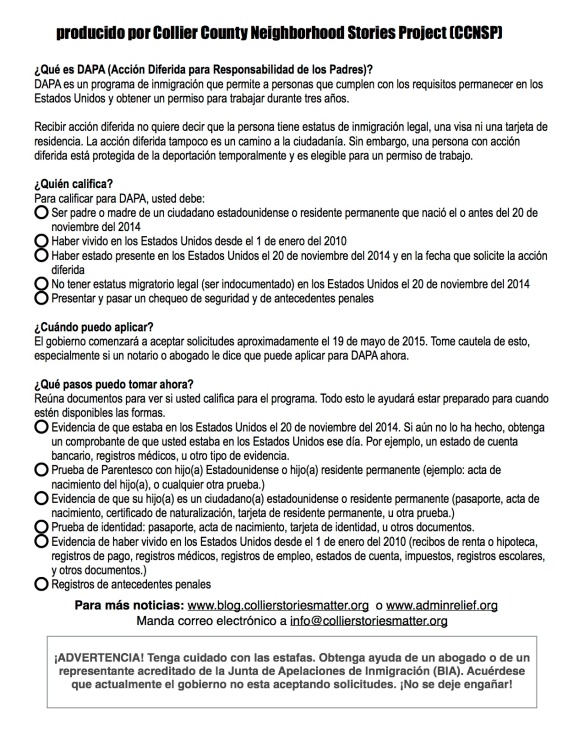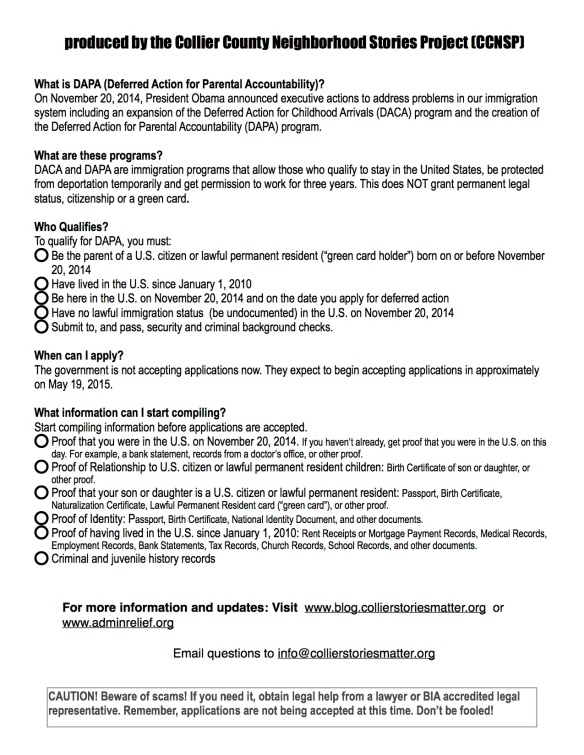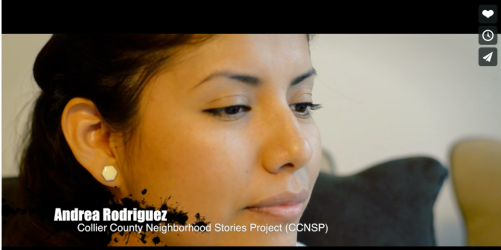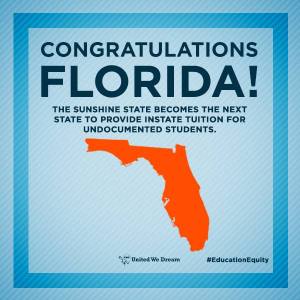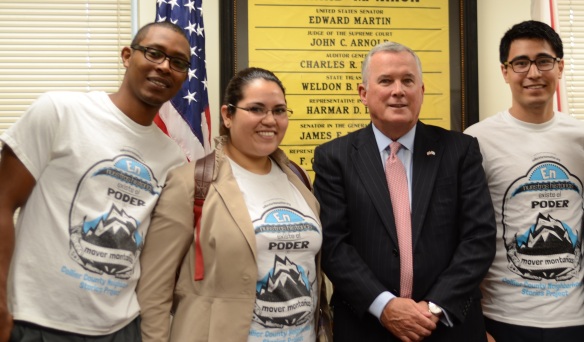A day after the Florida legislature voted favorably on SB1400, a current measure that would allow undocumented students to pay in-state tuition rates, a delegation of youth traveled to Tallahassee leaving at 2 AM in the morning to be ready to lobby at 9 AM.
These students fought against their fears and trepidations and were able to conquer being in the state Capitol for the first time! Here are their thoughts, in their own words, of what they saw, felt and think about this issue.
To read more press coverage, follow the links below:
FGCU students to legislators: Give undocumented Florida residents in-state tuition rates : Naples Daily News
Vista Semanal
NBC-2
Accion Hispana
Pictured below: Nestor Prime, Faviola Vargas and Andy Martinez. They are undocumented.
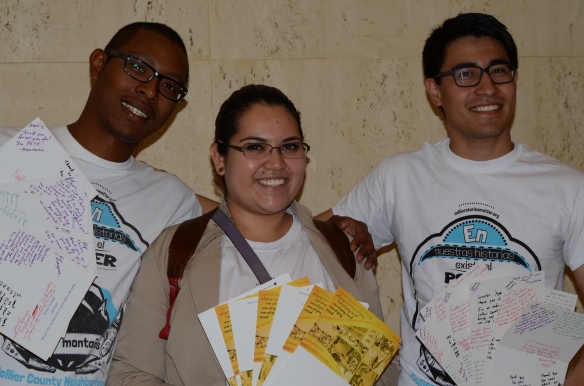
FAVIOLA VARGAS, 22, GRADUATE FROM GOLDEN GATE HIGH SCHOOL, HER DREAM IS TO BECOME A CRIMINAL INVESTIGATOR
I can start by telling you that I had an amazing time from beginning to end. This trip to Tallahassee was an unforgettable experience. Meeting up with Fran [the Florida Immigrant Coalition’s Policy and Advocacy Coordinator] who helped a lot by explaining how politics work, made the process of lobbying the legislators a lot easier. I understood what it takes for a bill to become a law in our state. The best part was when we had to go and meet up thanking the representatives and senators who are in favor of tuition equity. Although it was a little intimidating at first, we finished with a deep breath of satisfaction and accomplishment. CCNSP has made me a stronger, confident and positive individual. It has shown me that if you want something changed, you have to get out of your seat and fight for what you believe in. As the saying goes, “not everything is going to come at you in a silver platter.” I am very lucky to be part of this movement and meet so many people that support and believe in me. I feel confident that we are going make GREAT things happen. This trip help me realize that we are all united as one and we can fight for what we believe in. I also realized that we, as undocumented but Americans at heart, have experienced similar things that help us identify with each other. It makes it a lot easier to, not only speak for ourselves, but for all of our brothers and sisters who are still in the shadows and are afraid to fight for their rights. It’s funny how I hated politics back when I was in high school; I was never interested. But now I see how political games directly impact my life and those around me. I will continue fighting for this issue and understand that this is a long-term commitment that I must make for myself and those I care about.
NESTOR PRIME, 24, GRADUATE OF IMMOKALEE HIGH SCHOOL, DREAMS OF BECOMING A COMPUTER PROGRAMMER
It was a Tuesday night filled with excitement as some CCNSP members and I drove up to the state Capitol. After eight hours on the road, we arrived. We were tired but ready to start the day. For some of us, it was our first time in the capital and didn’t know what to expect.
Everything is fast paced in the capital and everyone has somewhere to be. We were fortunate to have a great guide, Francesca Menes from the Florida Immigrant Coalition. She introduced us to some of her coworkers and was able to show us around the capitol. Although everyone is always on the run, we had the opportunity to meet and give thanks to members of the House and Senate who supported tuition equity for undocumented youth in Florida. That included our local Senator, Garrett Richter, who I was grateful to meet.
In conclusion, it was a great first trip to the state capitol. I was able to see first hand the process of how a bill becomes a law and how amendments are voted on. I plan on going back to support and lobby for tuition equity. I conquered my fears in doing something new for the first time and I know that in the future, things will be even better! I am motivated to continue working on this issue because I believe that we can win.
ANDY MARTINEZ, 22, GRADUATE OF LELY HIGH SCHOOL, DREAMS OF BECOMING A NURSE
As an undocumented student, traveling is always exciting as going places isn’t easy when you have no way of showing who you are and that you’ve always have been a resident of this country. My most recent trip was a very important one because it wasn’t a vacation. No, our trip to Tallahassee took us not only far from home but well past our comfort zone. If I had to summarize it, I would say it was a field trip. Having no real world experience on how our legislative system functions on a daily basis and how to behave in said environment, the experience as a whole was exciting and very fast paced. Meeting and speaking with new people every few minutes was a daunting task. Our biggest accomplishment, however, had to have been the way the experience left me feeling: empowered! I became involved only because a very good friend of mine recommended that I contact CCNSP and this was my step out of the shadows. I have to admit that it’s one of the best decisions that I’ve made recently. Meeting new people is sometimes very difficult, yet when you meet people who share something important to you, the process makes you feel like you’ve known them all along. Very few times have I ever felt so at home with people I just met. Everyone who was with us on this trip wanted to be here and was willing to fight for what we stand. Granted we got off to a rocky start because it was a new environment for all of us [meeting senators and representatives is not easy at first!], we learned and we didn’t let our uneasiness bring us down. Although I was the newest of the bunch, betweenNestor Faviola and myself, we did our best to work as a team and get our message across. By the second day, our confidence had grown and we could manage ourselves a bit more easily but not quite as well as our wonderful tour guide Fran! More than show us around an otherwise hectic maze she believed in us as did others in the state capitol! This trip brought me close to the people I needed to be with! Anything is possible and although I spent too much time not doing anything about my situation, I know now that my journey is far from over and there is plenty to be accomplished. My biggest downfall was being misinformed. That there was nothing I could do other than wait and hope that someone else would fix my problems but that simply isn’t the case. There is always something we can do and if you want something done, then you have to do it yourself! CCNSP may bring us together under one unfortunate circumstance but it will keep us together for another more important reason and that’s our desire to be successful. Having been together for only a few days, I felt a very strong bond between all of us and its one which I hope grows stronger. I am definitely looking forward to being part of CCNSP so that all students are treated alike regardless of where we come from!
